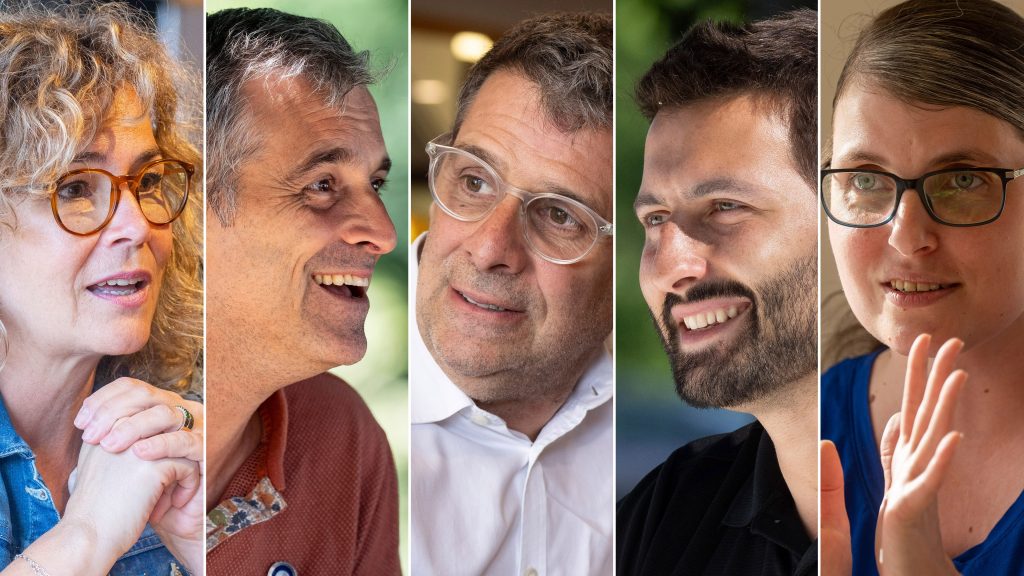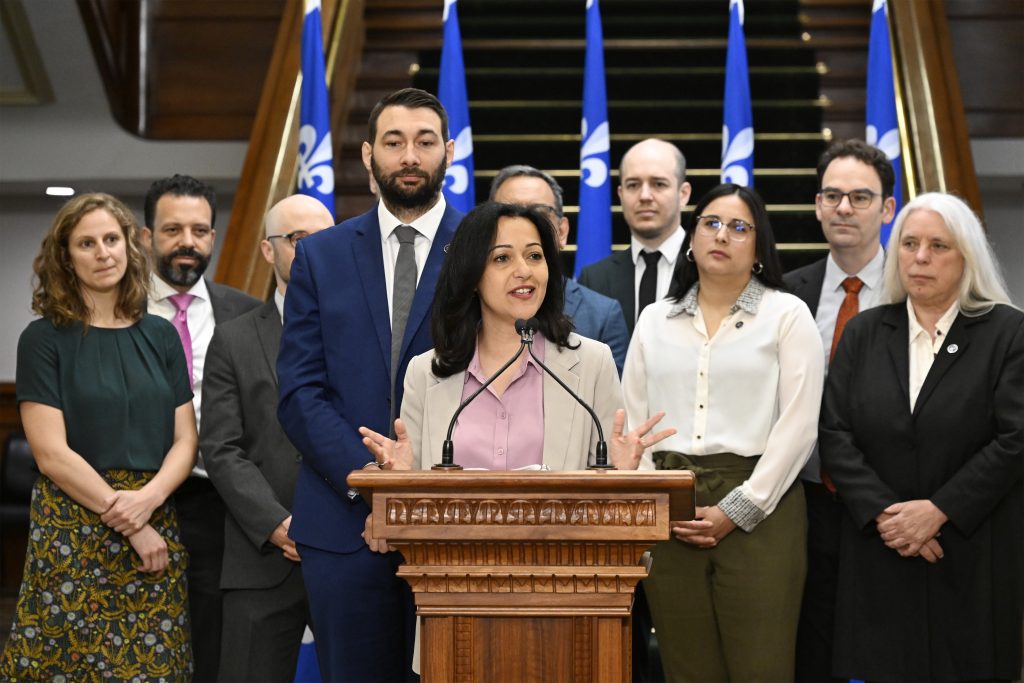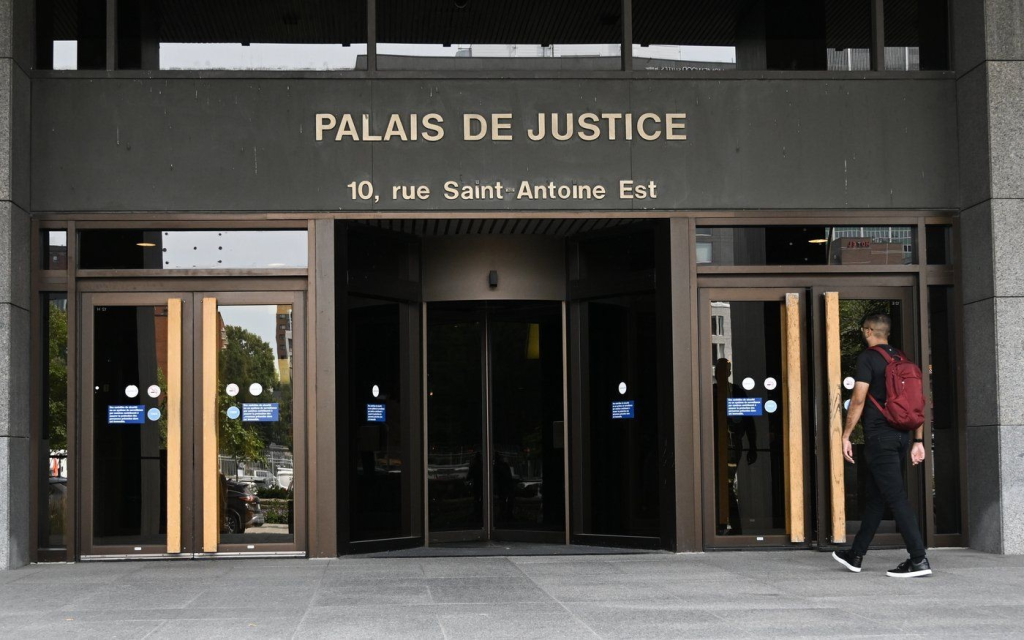Who are the men and women behind the partisan banners seeking to attract the approximately 63,000 voters in Arthabaska during the August 11 byelection?
The Canadian Press met with them with the intention of speaking to individuals, not politicians, as the election approaches. We present them in the order we met them, based on each person’s availability. The only concession to politics will be to ask them to identify a priority for the riding.
Related:
Chantal Marchand, PLQ: the sensitive dean
We first meet in a café in Victoriaville the Liberal Chantale Marchand, who has been up since 6:30 a.m., a 59-year-old woman for whom being moderate means “working more than criticizing.”
“I’m the oldest candidate in the constituency,” she says without hesitation. “I feel like I might be the one to say, ‘Hey, calm down, can we talk about the real issues? Can we get back to the basics?’” The foundation of her commitment is “values of social equity, values of kindness.”
As a grandmother, she has to deal with seeing her grand-daughter less, but her son had come to see her at the campaign office the day before “because he felt that grandmother missed her little baby.” As for the couple, “before I embarked, the most important thing was to have my husband’s agreement. I wouldn’t embark if he wasn’t there.”
When it comes to identifying a priority, health care is the top priority. “We’re the riding with the highest number of people without access to a family doctor. There are 8,000 people without access to a family doctor.”
Then she adds mental health, and suddenly, without warning, her face falls. Tears appear. The explanation, overwhelming, comes immediately. “My daughter is dead. She committed suicide three years ago. And if I can do anything to make sure there are fewer and fewer of them, it’s going to be part of my… I’m sorry,” she says, without finishing her sentence, which we understand nonetheless.
Her contagious smile quickly returns and she grants us permission to report everything, warning that “I definitely don’t want to be pitied.” We assure her that won’t be the case.
Alex Boissonneault, PQ: a settled past
We then head to Princeville to meet with PQ member Alex Boissonneault in a park in the shadow of the two bell towers of the magnificent Saint-Eusèbe church. The former journalist believes that at 46, “it’s still a good age to do it,” he says, speaking of his decision to switch sides of the microphone he’d been holding until then.
“I think about my children when I do this. I have four children, I think about their future, what I want to give them, what role model I want to leave behind as well.” He says he is worried about them, particularly when it comes to access to property, a question of intergenerational equity according to him, but also when it comes to protecting French culture.
Work-life balance: “That’s difficult. I won’t lie. I’m lucky I have my wife; it’s really a team effort. In the campaign, I’m in the field every day, and then she has to hold down the fort and she works too.”
He expected his past to be rehashed in the radical Germinal cell that plotted to breach the fence of the Summit of the Americas in Quebec nearly a quarter of a century ago, but “when it comes up, honestly in the vast majority of cases, it’s to say that people don’t like the smearing and don’t like people digging up the past to find problems.”
The dilapidated Hôtel-Dieu d’Arthabaska hospital was quickly raised as a priority, but it was part of a broader perspective on services, “the social contract,” he explains. “There are a lot of people who feel they’re not getting their money’s worth. That’s the contract. We pay taxes, we pay taxes, we expect the state to provide us with services. And right now, we feel like it’s not working.”
Eric Duhaime, PCQ: Mia’s Love
From there, we head to Saint-Louis-de-Blandford to meet Éric Duhaime, 56, who welcomes us to the Rioux restaurant-convenience store, a gas station on the edge of Highway 20. It’s hard to find a more symbolic way to meet a man often described as a populist.
The leader of the Quebec Conservative Party knows full well that he’s a lightning rod that attracts lightning in the form of often very harsh attacks. “I’m used to it, you know. I’m not the least controversial personality, let’s put it that way. At first, it affects us because we take it literally, as if it were personal, but over the years, we end up developing a kind of shell when we realize they’re attacking someone they don’t know. It’s affected me before, but it affects me less and less.”
For him, work-life balance is also “very difficult,” but we are surprised to learn that he misses his dog more than his partner, which he immediately explains by the fact that the latter comes to visit him often, while the beautiful Mia is staying at his parents’ house for the duration of the campaign. “When I knock on doors and they have dogs, people wonder why I pet their dogs more!” he laughs.
His parents, while we’re at it, are not very concerned with politics, but rather with the health of their son, who suffered a heart attack last December. This signal from his body made him pause and step back. “You have to be able to let go, and then let it go,” he says of his tendency to micromanage.
As Canada’s first openly gay Conservative leader, he says he has never been the target of homophobic remarks. “We are fortunate in Quebec to be one of the – if not the – most open societies in the world. Quebecers have many faults, but they are certainly not intolerant.”
As for his priority for the riding, the party leader can’t seem to move away from a provincial issue. “The ballot box issue is the price of gasoline,” says the man who wants to cancel the carbon tax. We really need to push hard to bring him back to a local issue, which will also be the Hôtel-Dieu d’Arthabaska.
Keven Brasseur, CAQ: gentleman of politics
Back in Victoriaville, we head to the election office of CAQ member Keven Brasseur, where his mother is also. “Today is his birthday. We’re going to have dinner together tonight for his birthday. My father also came to help me with my election signs. I definitely see them a little less with the campaign,” he explains, before taking us to Jean-Béliveau Park to talk to us under the watchful eye of the statue of “Gros Bill,” the glorious captain of the Sainte-Flanelle.
At 29, he is the youngest candidate aspiring for the Arthabaska seat. When he told his parents of his intentions, “my father said to me, ‘You know, Keven, it’s thankless. People, no matter what, are going to be angry with politicians.’ I said, ‘Dad, I want to make a difference.’ The worst thing that can happen is that I come out of this with a broken heart, but with the conviction that every day, I wanted to make a difference.”
Although he was until recently president of the local Chamber of Commerce, his roots are modest. “I come from a family—still, we always got by—but we weren’t rich. I was born on a milk-fed veal farm. My parents had that when we were young. My father sold in 2010, but throughout my teenage years, my first jobs were tying hay, looking after cows, rock picking, picking rocks in the fields,” he is careful to explain.
Single and childless, the problem of work-family balance doesn’t really arise… for now. “I want to start a family. I want to meet someone, settle here, start a family in the region here.”
He, too, places the Hôtel-Dieu at the top of his priorities, except that when he goes door-to-door, “a lot of people tell me that their concern is knowing who can beat Éric Duhaime. That’s going to be the question at the ballot box, in my opinion.” That didn’t stop him from becoming a political go-between: “When Éric Duhaime arrived, I told him, ‘Eric, I’m going to introduce you to Chantal (Marchand).’ I think that in politics, it’s important to be a gentleman. It’s so difficult, being in politics today, that we have to respect each other.”
Pascale Fortin, QS: the false politician
We will have to wait until the end of the day to meet Pascale Fortin, standard-bearer of Québec solidaire, in another café, since she is still working full time despite the election campaign.
“I’m not a real politician,” laughs the 37-year-old candidate, who explains her presence in politics through her work as a nurse, where “I saw that there are a lot of problems” and that her ability to change things was limited. “I know I can help, I know I’m good at it, but not because I aspire to anything,” she is careful to point out.
Her campaign is also rooted in her own experience. “When I speak to the world, I’m the nurse, the mother, I do the grocery shopping, like everyone else. But I love politics. It’s taught me a lot of things, about myself, a lot.”
With her 12-year-old son and her partner’s 17-year-old son, she’s probably the one for whom work-family balance is the most demanding since she hasn’t left her job to campaign. “I’m lucky,” she says. “My husband is a corporate chef. He’s not political at all, and he told me he’s going to be even more involved in the food. That’s his contribution to my campaign. That’s already a lot for me,” she says, taking care to add that she hasn’t completely deserted the kitchen.
Obviously, her door-to-door time is limited, and as the standard-bearer of the most left-wing party, she sometimes encounters hostility. “There’s one party in particular that, if you approach people who are for that party, it’s no, no, no. There’s an aggressiveness, and I find that hard,” she says, confirming that this party-whose-name-we-can’t-pronounce is obviously the Conservative Party. “I find it a shame because I think we can talk to each other, we’re human, and we all want the same things in life: to be safe, to have food, to have a roof over our heads.” This is the priority she identifies, that of housing being too scarce and too expensive.
Five other candidates will be on the ballot, but it would be surprising if they had any impact on the final result. This will also be the last time there will be an election in Arthabaska. The riding will become Arthabaska-l’Érable in the next general election, scheduled for fall 2026.
–This report by La Presse Canadienne was translated by CityNews





